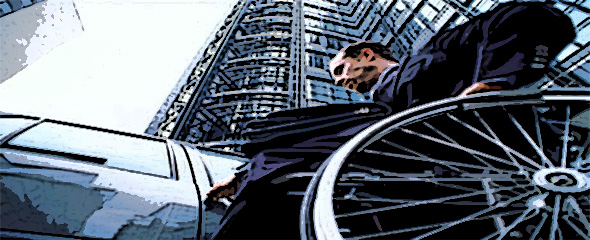Our environment changes and so should we.
Guest Blogger Mike Cottingham. Assistant Professor, Southern NH University
I dropped a pen. Not an uncommon occurrence for me, but I smile because no one rushes over to pick it up. I head into class and no one awkwardly hurries to open the door for me. It’s my 8 am class, so they are only half awake. I’m greeted with smiles, a few students texting and a smattering of yawns. We have a robust discussion about how to avoid lawsuit when a fan is injured, followed by new material on contract law and its impact on sports. I remind them as they leave the room that they have a case brief due next week and a reading quiz next class. I realize, in this room and in these halls, I’m a professor and I’m not disabled.
Social activists, philosophers and academics have for some time argued about what defines a disability. While there are a number competing theories, I tend to caucus with those who state disability is an environmental limitation. If you modify the environment, the disability can become nullified or at least minimized. Despite the fact that my injury has not changed, I am clearly less “disabled” now than 15-20 years ago. Back then my wheelchair weighed 20 lbs more, curb cuts were still a rarity, the ADA was only recently enacted and I drove my friends’ cars using a pool cue or a tennis racquet before I scored my first set of portable hand controls (kids, don’t try this at home).
Times have truly changed. Where I was thrilled to see a curb cut in the early 90s, I now expect it. This access has made me less disabled but this isn’t the only reason I feel less disabled. I think back to being 11 years old, a shy awkward kid barely comfortable pushing my own wheelchair. I remember Randy Snow putting his arm around me and saying “Michael, see that guy, he drives that car to be noticed, that woman does her hair a specific way so people pay attention to her. People develop ways of moving, of talking, of interacting all with the hopes of being noticed. When we come into a room, people will always notice us. We have what everyone wants, it’s just a matter of what we do with it.” I remember that moment deciding that I was going to be fearless—I wanted to be an extrovert, I wanted to shine in a room because I was going to embrace being noticed. I remember deciding I would approach society in a different way so that I could get out of society what I wanted.
These days I sit in a very tall chair so I can better make eye contact, I choose a vocation that minimalizes my disability, I always get to the airport early enough to not stress out the flight staff or the security guards who give me a massage and pat down before assessing that I’m not a terrorist and I have prepared responses so when people ask me as I’m getting out of my car and someone says “can I help you?” I reply “can you grade my students’ tests for me?” They look confused and then get it and chuckle with me. It’s not enough to expect society to accommodate us, we have to see how we might best fit in society while still being true to who we are and who we want to be. If disability is environmental, then society should accommodate for us but we should also make sure that we consider what accommodations we can make to better experience life within that environment.




Well said…..
Not exactly peurly disability related, but I find it has a lot of meaning to me with my neurodiversity: “Let’s stop “tolerating” or “accepting” difference, as if we’re so much better for not being different in the first place. Instead, let’s celebrate difference, because in this world it takes a lot of guts to be different.” Kate Bornstein
I always lead with a smile. It disarms those who aren’t sure what to make of me or how to interact with me. More often than not, people forget that I’m in the chair after getting to know me.
When I’m in class, I’m usually the first one to answer my professors questions to the class. I may be a little older or more mature than my fellow students but I’m there to learn & to participate. I’m not going to use that time to sit on my hands. School is my job right now and I’m trying to make the most of the opportunity I have to be there.
I try to make the most out of every opportunity that comes my way. Whether someone is living with a disability or not, one thing remains equal among all people and that is the fact that we only go around this life once. Making the most of it seems the best way to spend what little time you have.
I really like this. I’m glad Randy Snow helped you to figure this out so young.
Very well written Michael!